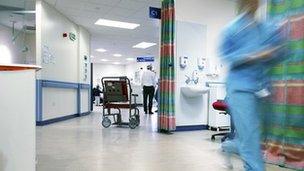NHS bill: Lords approve NHS reforms
- Published
- comments

Critics of the bill say it would fragment the NHS but ministers say it will put patients first
The government's planned changes to the NHS in England have cleared their final reading in the House of Lords.
Labour have forced a Commons debate on whether MPs can consider planned NHS changes for a final time before an assessment of the potential risks to the health service is published.
It will take place on Tuesday after being granted by Speaker John Bercow.
The government has agreed to a series of changes to the bill and wants it to become law as soon as possible.
MPs will consider amendments to the bill agreed by the Lords on Tuesday - the final stage in its passage - but only after the 90-minute emergency debate on the plans.
The bill has been the subject of a prolonged battle over the past year - with professional bodies representing doctors, nurses and other NHS workers resisting the changes.
The legislation would abolish Strategic Health Authorities and Primary Care Trusts and give much greater control over care budgets and commissioning decisions to GPs and other health professionals.
Opponents are trying to mobilise support behind a last-ditch attempt to try and delay the bill, saying the financial implications of the changes to the NHS must be properly considered.
Meanwhile, scores of people staged a candlelit vigil to protest on Monday night against what they called the "destruction" of the NHS.
Some 25 protests were held across the UK to draw attention to the proposed changes.
'Right to know'
The Freedom of Information Tribunal recently upheld a decision by the Information Commissioner that the NHS transitional risk register must be published. The government have said they will not do so until the tribunal has explained its ruling.
The register was drawn up to calculate the risks relating to the implementation of the bill.
Shadow health secretary Andy Burnham said it was "highly unsatisfactory" that MPs would not have an opportunity to consider the information in the register before finally approving the bill.
"Parliament has a right to know, before it is asked to make a final judgment that will have huge implications for every person in this country," he told MPs.
In the Lords, crossbench peer Lord Owen called for a similar delay to the bill's third reading in the Upper House pending the publication of the document. But his motion was defeated by 328 votes to 213.
Ministers say some of the details in the register have already been published in impact assessments, external and that publishing the entire document would flout a fundamental principle that advice by officials given in confidence should be protected.
Speaking in the Lords, Health Minister Earl Howe said the bill had been subject to more scrutiny than any other in recent times, with parliamentary debates of "unparalleled duration and scope".
"I cannot accept for one moment that without sight of the transition risk register the House has somehow been denied a deep insight into what this bill means for the NHS," he said. "It is an absurd proposition."
Amendments
Peers considered a series of amendments to the bill, including on the registration of health care support workers and the functions of the body due to replace the Health Protection Agency.
And they rejected a motion by Labour peer Baroness Thornton calling for the bill to be dropped by 269 to 174 votes.
Her motion - which argued that the bill did "not command the support" of patients, NHS workers or the public and would lead to the "fragmentation and marketisation" of the health service - was defeated by 95 votes.
Lord Greaves was the only Liberal Democrat rebel who voted with Labour on Monday in their bid to block the bill's passage.
Some 73 Lib Dem peers voted against the amendment, along with 170 Conservatives.
The government has made a series of concessions on the bill, to limit competition and clarify the powers and responsibilities of the secretary of state in relation to the health service, but say it should now proceed.
The legislation must be approved by the end of the parliamentary session but, pending its approval by the Commons on Tuesday, could receive its Royal Assent and become law later this week.
- Published1 March 2013
- Published12 March 2012
- Published8 March 2012
- Published26 February 2012